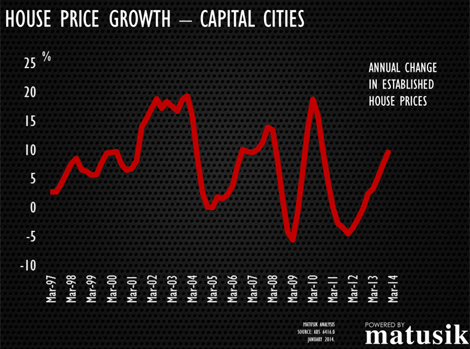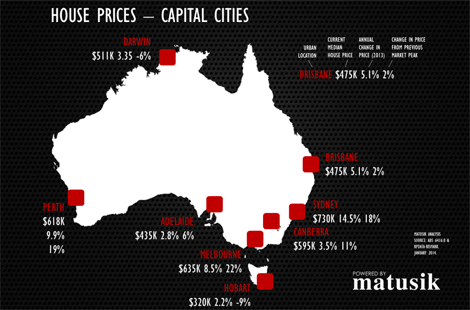Overheated markets set to see a 2015 correction
House prices have been rising. But the rises are not uniform across the country. The current recovery is against a period of relative weakness in house prices.
The housing market in Australia is quite cyclical, influenced by broad economic factors and in particular the cost and availability of money. Low interest rates and easier credit access could drive the current cycle too high.
At present, price levels (outside of Sydney, Melbourne and to some degree Perth) whilst above those in the US and Europe, are at the upper end, not beyond, the range of price to income ratios for developed countries. At present, arrears rates on housing loans remain relatively low in Australia.


The two graphics show that:
House prices are cyclical. Gains made now and into 2014 and 2015, could be eroded if prices grow too fast over the next 12 to 18 months. Some of the current price forecasts (15% to 20% for 2014 alone) will mean, if they eventuate, a potentially big slide in prices come late 2015 and beyond. There is really little wriggle room for house prices to move. Something in the order of 5% to 8% over the next 12 to 18 months is, for mine, much more viable. Again for mine, if price growth exceeds, say, 10% this year, then budget on price falls post mid-2015.
Not all capitals are enjoying the rush. Some haven't seen any improvement really in house prices yet. Everything is Sydney, Melbourne and Perth and some locations (like every other cycle) will miss out. I cannot see Hobart, Adelaide, Canberra or even Darwin enjoying much house price growth this year. In contrast, South East Queensland is in the box seat. Perth is likely to slow. I also think that Sydney and Melbourne will see price growth this year, but they are already 'over cooked'. Both markets can expect a correction - and maybe big ones - in late 2015.
With stubborn, high unemployment, full-time job losses and benign inflation - and despite its inflationary impact on house prices - interest rates need to fall further. The collateral damage will be an overheated house price cycle. This is why house prices cycle.
What will stop this current cycle is any rise in interest rates and an increase in mortgage defaults (which will lead to tighter lending practices). Care must be taken not to borrow too much.
Read Michael’s Blog or follow him on Facebook and Twitter or connect via LinkedIn.